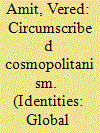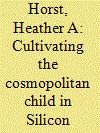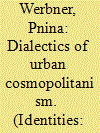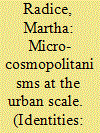|
|
|
Sort Order |
|
|
|
Items / Page
|
|
|
|
|
|
|
| Srl | Item |
| 1 |
ID:
140439


|
|
|
|
|
| Summary/Abstract |
Recent scholarly conceptualisations of cosmopolitanism have often distinguished between mundane practices on the one hand and a conscious assertion of an ethical project on the other hand. But this kind of distinction may be less a matter of the simple presence or absence of a particular kind of consciousness than of the degree of self-awareness as well as of the consonance or disjuncture between this consciousness and what can actually be realised in practice. In this article I take up some of these questions of degree and disjuncture to reflect on the interaction between aspirations and circumscribed experiences occurring among two sets of Canadian travellers: (i) consultants whose specialisation in international projects involves frequent stays abroad, and (ii) young adults who have taken up opportunities for an extended stay abroad afforded by university exchanges or working holidaymakers programs.
|
|
|
|
|
|
|
|
|
|
|
|
|
|
|
|
| 2 |
ID:
140445


|
|
|
|
|
| Summary/Abstract |
How does cosmopolitanism emerge in regions characterised by diversity and difference? This article examines the ways parents living in Silicon Valley, California seek to realise, maintain and manage ‘cultural and political multiplicities’ in their efforts to create cosmopolitan environments and sociality for their children and families. Grappling with the tension between cultivating academic achievement and cosmopolitan sociability, I explore how parents create opportunities for cosmopolitanism experiences and spaces, moving away from schooling towards education through international travel and philanthropy. The article reflects upon the challenges parents face as they attempt to realise their good intentions, ideas and attitudes to facilitate cosmopolitan sociability in a region where diversity is located in everyday interactions and encounters. I conclude by drawing connections between changing practices and how structural constraints influence parents’ approaches to cultivating cosmopolitanism over time.
|
|
|
|
|
|
|
|
|
|
|
|
|
|
|
|
| 3 |
ID:
140441


|
|
|
|
|
| Summary/Abstract |
Cosmopolitan cities have been envisioned as colourful, aesthetically creative places at the centre of trade routes and empires, imaged in their bazaars and cafes, where spices and exotic objects are traded or avante-garde artistic and literary expatriates congregate. In the twenty-first-century world of accelerated migrations, cosmopolitan cities are made visible in the proliferation of ethnic restaurants and festivals. But despite their cultural heterogeneity, cosmopolitanism in cities remains a fragile achievement. Such cities have the potential, it seems, to erupt into violence or, on the contrary, to display an intercultural creativity that transects and transcends social divisions. Building on Humphries and Skvirskaja’s work on ‘post-cosmopolitan’ cities, the present paper compares Eastern Mediterranean cities historically famous for their cosmopolitanism like Istanbul and Thessalonika, contemporary post-Communist cities like Sarajevo or Odessa and twenty-first-century global cities like Cairo or London to ask: what makes these cities both cosmopolitan and anti-cosmopolitan?
|
|
|
|
|
|
|
|
|
|
|
|
|
|
|
|
| 4 |
ID:
140444


|
|
|
|
|
| Summary/Abstract |
In what ways can refugees be both cosmopolitan and diasporic? This article juxtaposes published memoirs with material from ethnographic research in order to analyse the discursive frameworks through which Vietnamese Americans of the 1.5 generation negotiate both diasporic imaginaries and cosmopolitan aspirations. The collective memories of the Vietnam War that circulate in the Vietnamese American diaspora place obstacles in the path of a younger generation who aspire to be cosmopolitans, but are entangled in memories of the trauma and dislocation of the war and must also respond to a pervasive ideology of anti-communism, which is a form of anti-cosmopolitanism, among the first generation. This case study points to the ways in which our current scholarly efforts to expand ideas of both diaspora and cosmopolitanism to include a variety of positions and aspirations can benefit from more attention to the modes of cultural expression produced by the populations we study.
|
|
|
|
|
|
|
|
|
|
|
|
|
|
|
|
| 5 |
ID:
140442


|
|
|
|
|
| Summary/Abstract |
Scholars may no longer see cosmopolitanism as the preserve of the jet-setting elite, but they still tend to focus on international travel as the primary means of acquiring cosmopolitan competence. However, one should not confuse mindsets with mileage: if travel does not always generate cosmopolitanism, then neither is it a precondition for it, so stay-at-homes can become cosmopolitan too. This article draws on ethnographic fieldwork in multiethnic neighbourhoods of Montréal, Quebec, to show how cosmopolitanism can be produced and practised within the microcosm of the city. While international mobility is not necessarily part of these negotiations of difference, other kinds of spatial and social mobility are, especially intra-urban mobility and mobility of the imagination. Examining micro-cosmopolitanism at the urban scale, however, also reveals that practices of and aspirations towards cosmopolitanism do not necessarily coincide.
|
|
|
|
|
|
|
|
|
|
|
|
|
|
|
|
| 6 |
ID:
140438


|
|
|
|
|
| Summary/Abstract |
Within the interdisciplinary literature on cosmopolitanism, one particularly important distinction stands out as a recurring motif. Specifically, scholars have been concerned to distinguish between cosmopolitanism as a set of mundane practices and/or competences on the one hand and cosmopolitanism as a cultivated form of consciousness or moral aspiration on the other. For anthropologists, this distinction between aspiration and practice is often rendered ambiguous across the diverse expressions of cosmopolitanism that they encounter ‘on the ground’. This special issue therefore brings together five contributions from anthropologists who are reporting on encounters and aspirations that reveal different forms of spatial mobility, scales of commitment or risk, and are often transient, ambivalent and precarious. These are circumstances in which cosmopolitanism emerges as uneven and partial rather than as a comprehensive or unequivocal transformation of practice and outlook.
|
|
|
|
|
|
|
|
|
|
|
|
|
|
|
|
|
|
|
|
|